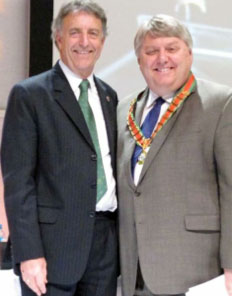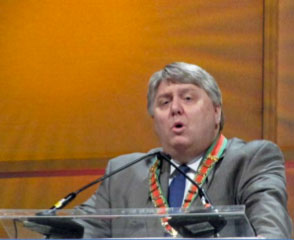WONCA President inaugural speech
Professor Richard Roberts became President of Wonca on 22 May 2010 in Cancun, Mexico. After conferring the honour of Wonca Fellowship on his predecessor, Professor Chris Van Weel, Rich made the following inaugural address to those assembled at the Cancun Center.
I’d like to start with a couple of thank yous – the first to Dan and Ruth Ostergaard and my many American Academy friends who have become part of my family over the years. Most important, though, I want to thank my family. This week has been busy for our family. We have had three graduations; Laura and I celebrated our 36th wedding anniversary on Monday; and there was this President thing that came up in Mexico.I have asked myself several times over the years, “Why is it that I do what I do? What keeps me on the road too much and working too hard, doing homework with the kids by Skype and speaking with patients by webcams while abroad?”

Professor Chris Van Weel (left) after presenting the chain of office to his successor as WONCA President Professor Richard Roberts (right).
I think I do what I do because it has been my small way of trying to make the world a better place for my family: Laura, my bride of 36 years, our oldest son Matt, our second son Ben, our one and only daughter Maggie, and our youngest son Alex, who is still probably angry at us for making him stay home to finish high school. I know he would rather be here. I hope they can continue to travel with me whenever their schedules and our family finances allow. I hope you can experience what extraordinary people they are and how proud I am of them.This is a Saturday in Cancun, and what do you think I was doing first thing this morning? I wasn’t on the beach. I wasn’t at the pool. I was on Skype with patients!
I was talking to four patients.1 Two were in the hospital; the other two were a new mother and baby. John is an 83 year old electrician. He does not consider himself a retired electrician; he is still an electrician. He’s had two strokes. We’ve spent the last eight years since the second stroke negotiating how high up the ladder he can climb because he has terrible balance problems. When he was hit by pneumonia yesterday, I knew his balance problems would be worse: he is back in hospital today.Len is 58 year old man who had his first heart attack at 34. He has polycystic kidney disease and familial dyslipidemia. He had a kidney transplant and has done an amazing job of living a very vigorous life, but now, he is in heart failure. Len can be a pretty cranky guy when he is sick. I said to my partner by Skype, “Ask him about Harley Davidson motorcycles and that’ll smooth everything over.” My partner called me later today and said that it had worked.
Trudie and her baby girl are doing well; I am going to be seeing them on Monday, when I am back in the office.So, why am I on Skype when I should be at the beach? I think that what we do is a privilege. It is a sacred trust and responsibility. We are invited into the lives of our patients and their families and, in doing so, we bear witness to great suffering, but also great joy, such as when we attend the birth of a new life. We see great sacrifice and great courage.I think it’s a great job!
I also think we’ve come to a moment in time that is going to change not just the future of health care, but the future of the human race. I really do believe this. People are talking about Primary Health Care in every country of the world. Last May, 192 delegates to the World Health Assembly voted to adopt a resolution that put Primary Health Care and family doctors at the center of every health system.What we do as family doctors is so vitally important, because we bridge from the individual to the community and, in so doing, we make both the individual and the community better. I also believe that to do our job properly we will need three things – the three S’s: Science, Support, Service.

WONCA President Professor Richard Roberts speaks in Cancun
My students and residents are tired of hearing me say that the Science sucks, but it does. If we look at biomedical knowledge, with the critical eye of a good scientist, most of the evidence that we have to use in daily medical practice is inadequate. It is poor quality science: it does not account for the multiple co-morbidities, the complexity of individual circumstances, the challenges of different health systems.We then generalize from these very uni-dimensional studies to entire populations and that’s just wrong. I believe that family medicine can be part of defining that new Science. At this meeting, we’ve created a Special Interest Group (SIG) on Complexity. I think that’s part of the answer, but we desperately need a new, and better, science.
The second is Support. We somehow have to figure out how to bring resources together; to help family doctors around the world work with each other around patient care, around research, around education. Wonca can, and must, be that source of support. We have a very big hill to climb, and it will take us a long period of time.I am very hopeful that we are all willing to take a fresh look at how our national colleges work and pull together, so that World Wonca can work to make family medicine better for everyone.
And, I believe as family doctors we need a new commitment to Service.Last month, I was visiting with a medical student and I asked him what it was about General Practice (which was the term used in his country) that excited him. He answered, “It’s the lifestyle: I like the surf, I like to race motorcycles and being a GP allows me to do those things.”I felt very sad. The reason I felt sad was not because the people he was going to take care of were going to get bad care - they were probably going to get pretty good care. I felt sad for him because if he couldn’t bring a similar level of interest and passion to being a GP, which he was going to spend a third of his adult life doing, then it was going to be a pretty long life. It’s not that we do great things for other people; it’s that they do great things for us. That’s what I'm worried that he’s going to miss out on.
So, as we go back to our daily practices, I would ask each of us to think about the person in front of us right now, who needs us. That's what I’m talking about when I am talking about a new commitment to Service. What we do with the World Health Organizaton (WHO) is very important. What we do with medical schools is very important. But, those are all secondary to the person in front of us.And, I believe that as family doctors we can help heal this world. We are going to do it one person at a time, which will help one family at a time, which will help one community at a time; and, over time, which will help our one world. I believe it only takes one of us to do that and I think you could be that one.
I look forward to the next three years: to doing my best to be your voice; to share with the rest of the world what it means to be a family doctor; to understand the experience of you and your patients; to help Wonca help you do better.Thank you very much for this honor and responsibility.
Professor Richard Roberts
1 the patients’ names have been changed